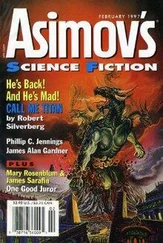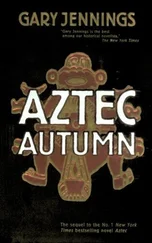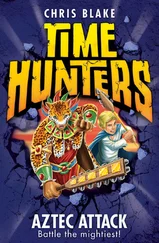Gary Jennings - Aztec
Здесь есть возможность читать онлайн «Gary Jennings - Aztec» весь текст электронной книги совершенно бесплатно (целиком полную версию без сокращений). В некоторых случаях можно слушать аудио, скачать через торрент в формате fb2 и присутствует краткое содержание. Жанр: Старинная литература, на английском языке. Описание произведения, (предисловие) а так же отзывы посетителей доступны на портале библиотеки ЛибКат.
- Название:Aztec
- Автор:
- Жанр:
- Год:неизвестен
- ISBN:нет данных
- Рейтинг книги:4 / 5. Голосов: 1
-
Избранное:Добавить в избранное
- Отзывы:
-
Ваша оценка:
- 80
- 1
- 2
- 3
- 4
- 5
Aztec: краткое содержание, описание и аннотация
Предлагаем к чтению аннотацию, описание, краткое содержание или предисловие (зависит от того, что написал сам автор книги «Aztec»). Если вы не нашли необходимую информацию о книге — напишите в комментариях, мы постараемся отыскать её.
"Anyone who reads, anyone who still lusts for adventure or that book you can't put down, will glory in Aztec."--Los Angeles Times
Aztec
Aztec
Aztec — читать онлайн бесплатно полную книгу (весь текст) целиком
Ниже представлен текст книги, разбитый по страницам. Система сохранения места последней прочитанной страницы, позволяет с удобством читать онлайн бесплатно книгу «Aztec», без необходимости каждый раз заново искать на чём Вы остановились. Поставьте закладку, и сможете в любой момент перейти на страницу, на которой закончили чтение.
Интервал:
Закладка:
He shuffled several sheets of bark paper in his hand and gave one sheet to a slave boy who sat crosslegged at his feet, holding a miniature drum on his lap. Then the visitor announced in a voice which, though soft-spoken, carried well, "With the Lord Teacher's permission, my young lord and lady students, I will not recite today from my own works, but from those of a far greater and wiser poet. My father."
"Ayyo, with my permission and pleasure," said the Lord Teacher, nodding benignly. The class also murmured a collective ayyo of approval, as if everyone there already knew the works of the poet-father he had mentioned.
From what I have already told you of our picture writing, reverend friars, you will have realized that it was inadequate for setting down poetry. Our poems lived by oral repetition, or lived not at all. Anyone who heard and liked a poem would memorize it and retell it to someone else, who might in turn tell it again. To aid the hearers in that memorizing, a poem was usually constructed in such a manner that the syllables of its words had a regular rhythm, and in such a manner that the same word sounds regularly recurred at the ends of its separate lines.
The papers the visitor carried bore only enough word pictures to assure that his memory did not falter and omit a line, to remind him here and there to stress a word or a passage his poet-father had thought worthy of special note. And the papers he handed to his drummer slave were marked only with brush strokes: many small dabs of paint, some larger ones, variously commingled and variously spaced. They told the slave the rhythm to beat out with his hand on the drum as accompaniment to the poet's recital: sometimes murmurous, sometimes sharply emphasizing the words, sometimes a soft throb like a heart beating in the pauses between the lines.
The poems the visitor recited and sang and chanted that day were all felicitously worded and sweetly cadenced, but they all were slightly tinged with melancholy, as when early autumn first steals in upon the summertime. After nearly a sheaf of years, and with no word pictures to aid my recollection, no drum to mark the beats and pauses, I still can repeat one of them:
I made a song in praise of life,
a world as bright as quetzal feather:
to skies of turquoise, sunlight gold,
to streams like jadestone, gardens blooming...
But gold can melt and jadestone shatter,
leaves turn brown and trees fall down,
our flowers fade, their petals scatter.
The sun sets soon, the night comes looming.
See beauty fade, our loves grow cold,
the gods desert, their temples weather...
Why does my song pierce like a knife?
When the recital was concluded, the respectfully attentive crowd of listeners stood up and broke apart. Some went strolling about by themselves, saying one or several of the poems over and over, to fix the words in their memory. I was one of those. Others milled about the visitor, kissed the earth to him, and regaled him with compliments and thanks. I was walking in circles on the grass, head bowed, repeating to myself that poem I have just repeated to you, when I was approached by young Prince Willow.
"I overheard you, Head Nodder," he said. "I too liked that poem best of all. And it made another poem waft into my own head. Would you oblige me by hearing it?"
"I should be honored to be the first," I said, and what he recited was this:
You tell me then that I must perish
like the flowers that I cherish.
Nothing remaining of my name,
nothing remembered of my fame?
But the gardens I planted still are young—
the songs I sang will still be sung!
I said, "I think it is a good poem, Huexotzin, and a true one. The Lord Teacher would most certainly give you an approving nod." And I was not just slavishly flattering a prince, for you will have noticed that I have remembered that poem, too, all my life. "In fact," I went on, "it might almost have been composed by the same great poet whose works we have heard today."
"Yya, come now, Head Nodder," he chided me. "No poet of our time will ever match the incomparable Nezahualcoyotl."
"Who?"
"Did you not know? Did you not recognize my father doing the recitation? He read the works of his father, my grandfather, the Revered Speaker Fasting Coyote."
"What? That man who recited was Nezahualpili?" I exclaimed. "But he wore no insignia of his office. No crown, no feather mantle, no staff or banner..."
"Oh, he has his eccentricities. Except on state occasions, my father never dresses like any other Uey-Tlatoani. He believes that a man should display only tokens of his achievement. Medals won and scars collected, not baubles inherited or bought or married. But do you really mean you have not yet met him? Come!"
However, it seemed that Nezahualpili was averse also to having his people too openly manifest their regard for him. By the time the prince and I elbowed our way through the throng of students, he had already slipped away.
The Lady of Tolan had not misled me when she warned that I would work hard at that school, but I will not bore you, reverend friars, with accounts of my daily schedule, and the mundane events of my days, and the sheaves of work I took back to my chambers at the end of each day. I will tell you that I learned arithmetic, and how to keep account books, and how to calculate the exchange of the various sorts of currency in use—all facilities that would be most useful to me in years to come. I learned about the geography of these lands, though at that time not much was known about any of the lands beyond our immediate own, as I would later discover by exploring for myself.
I most enjoyed and profited from my studies in word knowing, getting ever-more proficient at reading and writing. But I think I benefited almost as much from the classes in history, even when they refuted the Mexíca's most cherished beliefs and boasts. The Lord Teacher Neltitica gave generously of his time, even according private sessions to some of us. I remember one, when he sat down with me and a very young boy named Poyec, son of one of Texcóco's numerous lords.
"There is a grievous gap in Mexíca history," said the teacher, "like the wide gap an earthquake can cleave in the solid earth."
He was preparing a poquietl to smoke while he discoursed. This is a slender tube of some substance like bone or jadestone, ornamentally carved, with a mouthpiece at one end. Into the open other end is inserted a dry reed or rolled paper, firmly packed with the finely shredded dried leaves of the picíetl plant, sometimes mixed with herbs and spices for added flavor and fragrance. The user holds the tube between his fingers and sets fire to the far end of the reed or paper. It and its contents smolder slowly to ash, while the user lifts the mouthpiece at intervals to his lips to suck a breath of the smoke, inhale it, and puff it out again.
When he had lit his with a coal from a brazier, Neltitica said, "It was just a sheaf of years ago that the Mexíca's then Revered Speaker Itzcoatl, Obsidian Snake, forged The Triple Alliance of the Mexíca, the Acolhua, and the Tecpanéca—with the Mexíca, of course, as the dominant partner. Having secured that eminence for his people, Obsidian Snake then decreed that all the books of bygone days should be burned, and new accounts written to glorify the Mexíca past, to give the Mexíca a spurious antiquity."
I looked at the blue smoke rising from the poquietl, and murmured, "Books... burned..." It was hard to believe that even a Uey-Tlatoani would have the heart to burn something as precious and irreplaceable and inviolable as books.
"Obsidian Snake did it," the Lord Teacher continued, "to make his people believe that they were and always have been the true custodians of art and science, and therefore to believe that it is their duty to impose civilization on every lesser people. But even the Mexíca cannot ignore the evidence that other and finer civilizations had existed here long before their coming. So they have concocted fanciful legends to account for such evidence."
Читать дальшеИнтервал:
Закладка:
Похожие книги на «Aztec»
Представляем Вашему вниманию похожие книги на «Aztec» списком для выбора. Мы отобрали схожую по названию и смыслу литературу в надежде предоставить читателям больше вариантов отыскать новые, интересные, ещё непрочитанные произведения.
Обсуждение, отзывы о книге «Aztec» и просто собственные мнения читателей. Оставьте ваши комментарии, напишите, что Вы думаете о произведении, его смысле или главных героях. Укажите что конкретно понравилось, а что нет, и почему Вы так считаете.











